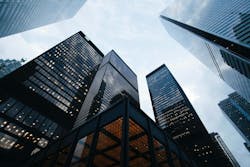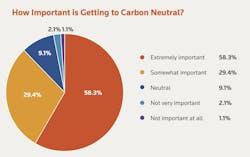Reaching carbon neutrality in building portfolios ranks high for organizations
Reaching carbon neutrality with their building portfolios ranks high in importance among sustainability goals for organizations responding to a Honeywell/Reuters survey of senior executives at 187 large, multinational corporations.
Nearly nine in 10 respondents (87%) say that achieving carbon neutrality in their building portfolio is either extremely (58%) or somewhat (29%) important in relation to their overall ESG goals. Only 4% of respondents called it unimportant.
“If we fast-forward to 2025, I believe carbon neutrality will be one of the top priorities for organizations, driven partly by new carbon taxation plans and decarbonizing incentives,” said Manish Sharma, vice president and general manager of Sustainable Buildings at Honeywell, in a news release.
While the surveyed organizations feel pressure to act, respondents seem optimistic in forecasting progress toward their goals. More than 90% of those surveyed expect to achieve carbon neutrality across their portfolios by 2050, while 62% expect to reach that goal by 2035. Only 8% of respondents say they don’t foresee carbon neutrality ever becoming a reality for their portfolios.
Companies are investing strategically to accelerate decarbonization and improve overall building performance. Although respondents noted a wide range of specific efforts, a substantial majority (80%) mentioned on-site energy management system as one investment they’ve made.
More findings from the Honeywell/Reuters survey of building owners:
- Building owners see waste and carbon reduction as the primary business benefit from improving the sustainability of their buildings. Other benefits include increasing productivity, reducing costs, improving their brand image, attracting investors, and attracting and retaining employees.
- The top two barriers to progress in sustainability and carbon neutrality are cost (29.6%) and measuring sustainability progress (21.7%). Others obstacles: lack of resources and expertise (19.7%), convincing c-suite/management (18.3%), convincing investors (6.3%), and "unsure where to start" (4.3%).

